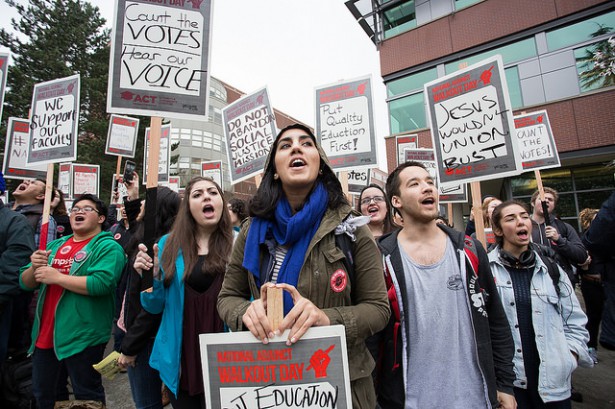
Photo credit: SEIU 925. Licensed CC-BY-SA.
by Kate Aronoff
Protesting poverty-level wages and a lack of respect from universities, adjunct faculty this week organized the first-ever National Adjunct Walkout Day.
Participating schools ranged from small community colleges to massive state universities. The west coast participated in droves, as adjuncts at Seattle University, the University of California-Santa Cruz and the University of Arizona — among others — walked out of the classroom at noon on Wednesday. Events drew out not just adjuncts, but non-tenure track and tenured faculty, undergraduates and grad students. Many were discouraged from coming out to the demonstrations for fear of reprisals from their universities. In places where adjuncts are unionized, they were discouraged from participating on the grounds that it would violate their contracts.
Some struck individually, while at other schools, such as the University of Maryland, entire departments’ faculty participated in the walkout, encouraging their students to do the same. Professional associations representing both tenure-track and adjunct faculty, including the Modern Languages Association, lent their support to the day of action.
While the day may have been more of a shared protest than a wildcat strike, other events — such as rallies, teach-ins and film screening — were held in lieu of striking, and appear to have been a success.
Organized by the Service Employees International Union and others, adjuncts at several schools around the country either have or are seeking to form unions to improve conditions such as payment, benefits and job security. Adjuncts now account for just under 75 percent of higher education faculty, up 40 percent in the last 30 years. Many adjuncts string together 4 or 5 classes — earning on average less than $3,000 for each course — in a given semester. Many universities then cap the number of individual courses an instructor can teach to prevent them from — heaven forbid — qualifying for benefits.
Poor adjunct working conditions hurt students, too. A fourth-year student at San Francisco Art Institute told Inside Higher Education, “It’s difficult to form a relationship with your professor when neither of you know if your professor will even be employed next semester.”
Though there has been consistent organizing around the issue, few even within higher education are aware of the adjunct crisis, and the connection between a decline in tenure-track positions and the rise in temporary labor within the Ivory Tower. Yeshiva University labor expert Ellen Schrenker said in an interview with the Chronicle of Higher Education that “The problem that adjuncts face in organizing, in improving their working conditions, is simply the utter unawareness on the part of the general public about their situation.” Wednesday’s action, then, may provide a foundation for more instructors and allies to become involved.
As one adjunct instructor at Iowa’s Boise State University said, “I’m paid to teach about fairness, yet I’m not treated that way by the university.”
Kate Aronoff is an organizer and freelance journalist based in Philadelphia, PA. While in school, she worked extensively with the fossil fuel divestment movement on the local and national level, co-founding Swarthmore Mountain Justice and the Fossil Fuel Divestment Student Network (DSN). She is currently working to build a student power network across Pennsylvania. Follow her on Twitter @katearonoff